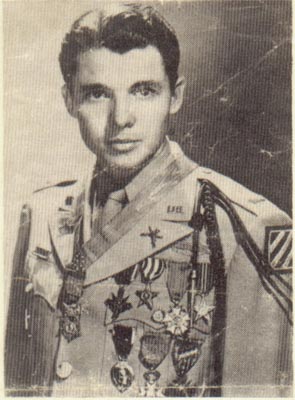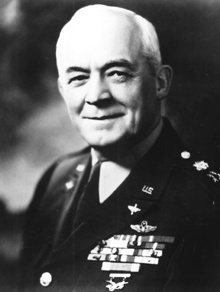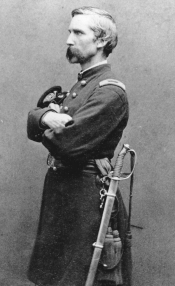|

Audie Murphy
Audie Murphy is widely known for his role in WWII and later as an actor in Hollywood. What is not commonly known
is that the Honorable Murphy was also a Mason, primarily doing his work in the Scottish Rite Bodies and as a Shriner.
This Soldier of War and Peace dedicated his life to the betterment of others and was rewarded with over 30 Medals including
the Legion of Merit, Silver Star, Distinguished Service Cross, and the Medal of Honor. Brother Murphy was recognized by the
Scottish Rite Bodies to receive the Knight's Commander Court of Honor in 1965, and his wife was presented his Honorary
33rd degree cap after being posthumously elected to that degree in 2000. His most regarded film is "To Hell and Back," and
to date, no one has ever surpassed him as being the Most Decorated U.S. Soldier in any single conflict.
|
 |

Harry S. Truman
Harry S. Truman was a man among men, and when duty called, he went. President Truman is known for his moral viewpoint
and unwavering integrity. These virtues are what makes a man a Mason, and Brother Truman was no exception. First being brought
to the world's attention while heading up the Truman Committee(wartime production investigative committee that saved
the taxpayers millions of dollars), he was thrust into the seat of Vice-President in 1944. Four years later, he became the
33rd President of the United States, taking over the office from the late Franklin D. Roosevelt, who was also a Mason. Brother
Truman was initiated in 1909 in missouri, served as the first W.M. of Grandview Lodge # 618, and in 1944 he was elected
to the position of Grand Master of Masons, the highest position a Mason can obtain. Brother Truman was also made
a 33rd degree, an Honorary member of the Supreme Council, and an Honorary Grand Master of the Supreme Council of the International
Order of DeMolay. He was presented with a 50-Year Award in 1959, and to this date is the only President to have received that
Honor. He also preferred to be introduced in the Lodge as Past Grand Master Truman, not President.
|
 |
 |
|

Henry "Hap" Arnold
Known as the Architect of Airpower, Henry "Hap" Arnold was a long time proponent of the skies and eventually
helped create what is today the United States Air Force. He began his career in 1907 with the Infantry, being transferred
to the Army Signal Corp in 1911, where he took instruction from Orville Wright and became a pilot. "Hap" Arnold was an
Instructor at the first Aviation School at College Park, Maryland, and oversaw the Aviation Schools during WWI. General
Arnold flew the very first Air Mail and Military Reconnaissance flight in U.S. History. He later became the Assistant Chief
of the Army AirCorp, Chief of the Army Air Corp, Commanding General of the Army Air Corp, and in 1944 he was appointed as
one of the first of nine 5-Star Generals in American History. Brother Arnold made a huge contribution to the creation of several
organizations including the Civil Air Patrol. He retired in 1946 and was named the First General of the Air Force in 1949.
|
|
 |
 |
 |
|

Joshua L. Chamberlain
Joshua L. Chamberlain began his Military career as a Lt. Colonel in the 20th Maine Volunteer Infantry and worked
his way to Brevet Major General of the U.S. Volunteers. Brother Chamberlain is credited with being one of the overall men
who changed the course of the war while entrenched at Gettysburg. He received the Medal of Honor 30 years after the fact for
his heroic and unconventional actions at the Battle of Little Round Top, which are portrayed in the movie "Gettysburg." Also,
this Honorable Brother helped establish the Medal of Honor to it's glory as the highest honor one can receive in combat
by denying it's issue to several hundred soldiers in garrison at Washington for extending their enlistment while his
men were being slaughtered in the Gettysburg Campaign. He was appointed by General Grant to preside over the confederate surrender
of colors at Appomattox.
Prior to the war, Chamberlain was a Professor of rhetoric at Bowdoin College, and afterwards he returned to Maine
as the Governor. Joshua Chamberlain rejoined Bowdoin College after his tenure as Governor, not as a Professor, but as it's
president. Later he became the Adjutant General of Maine's National Gaurd.
|
|

